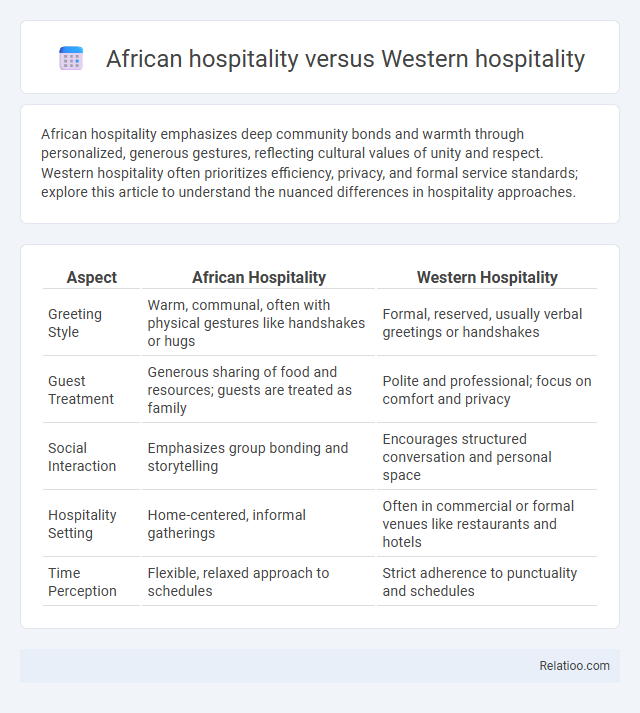African hospitality emphasizes deep community bonds and warmth through personalized, generous gestures, reflecting cultural values of unity and respect. Western hospitality often prioritizes efficiency, privacy, and formal service standards; explore this article to understand the nuanced differences in hospitality approaches.
Table of Comparison
| Aspect | African Hospitality | Western Hospitality |
|---|---|---|
| Greeting Style | Warm, communal, often with physical gestures like handshakes or hugs | Formal, reserved, usually verbal greetings or handshakes |
| Guest Treatment | Generous sharing of food and resources; guests are treated as family | Polite and professional; focus on comfort and privacy |
| Social Interaction | Emphasizes group bonding and storytelling | Encourages structured conversation and personal space |
| Hospitality Setting | Home-centered, informal gatherings | Often in commercial or formal venues like restaurants and hotels |
| Time Perception | Flexible, relaxed approach to schedules | Strict adherence to punctuality and schedules |
Understanding Hospitality: African and Western Perspectives
African hospitality emphasizes communal values, warmth, and extended family involvement, often prioritizing relationships and cultural rituals that foster a sense of belonging. Western hospitality tends to focus on efficiency, professionalism, and individualized service, with structured protocols designed to meet guest expectations quickly and effectively. Understanding hospitality requires recognizing these differing cultural frameworks, where African practices highlight social interconnectedness, while Western approaches prioritize convenience and standardized experiences.
Historical Roots of Hospitality Traditions
African hospitality is deeply rooted in communal values and oral traditions, emphasizing collective care and respect for guests as integral members of the community. Western hospitality, shaped by Greco-Roman customs and Christian ethics, often prioritizes individual service, comfort, and commercial aspects in lodging and dining experiences. Your understanding of hospitality traditions reveals diverse historical influences that continue to shape modern practices across cultures.
Community vs Individualism: Core Cultural Values
African hospitality emphasizes deep community bonds, collective responsibility, and shared experiences, creating a warm, inclusive environment that fosters strong interpersonal connections. Western hospitality typically prioritizes individual comfort, privacy, and personalized service, reflecting values of independence and self-expression. Your understanding of hospitality will vary significantly depending on these cultural core values, shaping expectations and experiences around hosting and guest interactions.
Welcoming Rituals and Guest Reception
African hospitality emphasizes warm, communal welcoming rituals often involving shared meals, storytelling, and traditional ceremonies that honor guests as family members or dignitaries. Western hospitality tends to focus on personalized, efficiency-driven reception with formal greetings, reservations, and professional service standards designed to meet individual guest preferences. Both approaches prioritize creating comfort and respect but differ in cultural expressions--African hospitality centers on collective belonging and ritual significance, while Western hospitality highlights convenience and individualized care.
Role of Family and Extended Networks
African hospitality deeply integrates the role of family and extended networks, where communal bonds and kinship ties shape the welcoming experience, often involving multiple generations and neighbors in hosting rituals. Western hospitality tends to emphasize individualism and nuclear family units, prioritizing privacy and personal space while maintaining formal social boundaries. Your understanding of hospitality broadens by recognizing how cultural values influence the scale and intimacy of hosting, with African traditions highlighting collective participation and Western approaches focusing on individual comfort.
Food Sharing and Mealtime Customs
African hospitality emphasizes communal food sharing with large, shared dishes symbolizing unity and generosity during mealtime customs. Western hospitality often features individual plating and formal dining etiquette, focusing on structured courses and personalized servings. Depending on cultural contexts, hospitality practices vary significantly, highlighting collectivism in African traditions versus individualism in Western dining experiences.
Hospitality in Business and Social Settings
Hospitality in business and social settings varies significantly across cultures, with African hospitality emphasizing communal sharing, warmth, and personal relationships, often involving elaborate rituals and generosity that foster trust and social cohesion. Western hospitality tends to prioritize efficiency, professionalism, and standardized service protocols aimed at maximizing customer satisfaction and operational effectiveness. Understanding these distinct approaches enhances cross-cultural communication and creates more meaningful engagements in global business and social interactions.
Privacy, Personal Space, and Social Boundaries
African hospitality often emphasizes communal living with less rigid personal space, valuing collective warmth and open social boundaries that foster close-knit relationships. Western hospitality tends to prioritize individual privacy and clearly defined personal space, maintaining formal social boundaries that respect personal autonomy and confidentiality. Overall hospitality balances these cultural nuances by adapting privacy expectations and social interactions according to context and guest preferences.
Gift-Giving and Acts of Generosity
African hospitality often emphasizes communal sharing and symbolic gift-giving, where presents such as food, handcrafted items, or livestock reflect respect and social bonds. Western hospitality tends to prioritize practical gestures and gift-giving as tokens of appreciation, including flowers, wine, or gift cards, highlighting individual relationships. In general hospitality, acts of generosity underscore cultural values, with African traditions focusing on collective well-being and reciprocity, while Western customs lean toward personal recognition and appreciation.
Evolving Hospitality Practices in a Globalized World
African hospitality centers on communal values, warmth, and personalized care rooted in cultural traditions, contrasting with Western hospitality's emphasis on efficiency, professionalism, and standardized service protocols. Evolving hospitality practices in a globalized world bridge these differences through technology integration, multicultural training, and sustainable approaches that enhance guest experiences across diverse cultural contexts. Global hospitality trends prioritize authenticity, digital innovation, and adaptive service models to meet the expectations of an increasingly interconnected and culturally aware clientele.

Infographic: African hospitality vs Western hospitality
 relatioo.com
relatioo.com